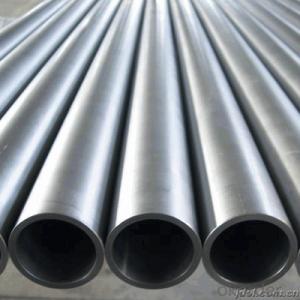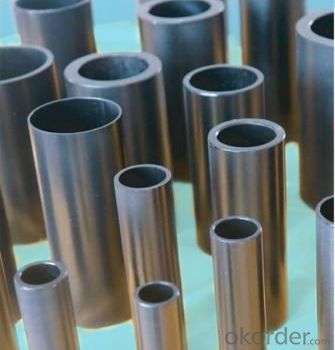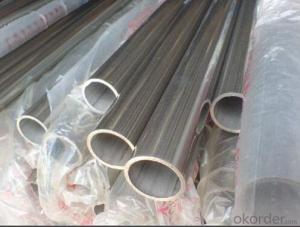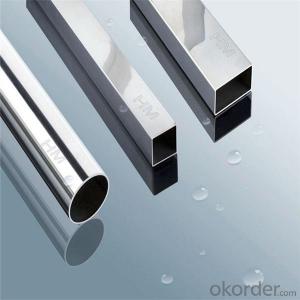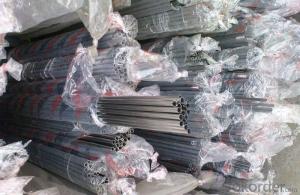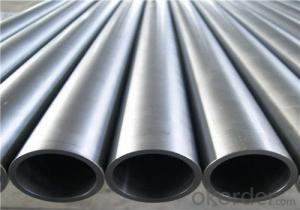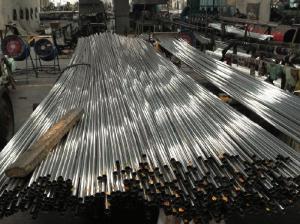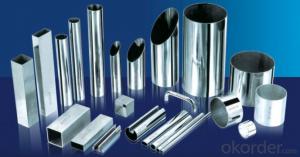Stainless Steel Welded Pipes 202 grade for decoration
- Loading Port:
- Qingdao
- Payment Terms:
- TT or LC
- Min Order Qty:
- 10 m.t.
- Supply Capability:
- 2000 m.t./month
OKorder Service Pledge
OKorder Financial Service
You Might Also Like
Stainless Steel Welded Pipes 202 grade for decoration
Main Features of Stainless Steel Welded Pipes 202 grade for decoration:
Material Grade: 201, 304, 316, 410, 430, etc
Outer Diameter: 8mm--114mm
Thickness: 0.16mm - 3.00mm
Length: 2440mm, 3050mm, 5800mm, 6000mm, 6100mm or as customer request.
Tolerance: a) Outer Diameter: +/- 0.2mm
b) Thickness: +/- 10% OR as customer request
c) Length: +/- 10mm
Surface:
Satin / Hairline :180#, 320#
Polish : 400# ,600# ,800# or Mirror surface
Application: Decoration ,( Processed into railings, handrails, doors and Windows )
Datas for Stainless Steel Welded Pipes 202 grade for decoration:
Chemical Composition Material | Composition material | 201 | 202 | 304 | 316 | |
| C | ≤0.15 | ≤0.15 | ≤0.08 | ≤0.08 | ||
| Si | ≤1 | ≤1 | ≤1 | ≤1 | ||
| Mn | 5.5-7.5 | 7.5-10 | ≤2 | ≤2 | ||
| P | ≤0.06 | ≤0.06 | ≤0.045 | ≤0.045 | ||
| S | ≤0.03 | ≤0.03 | ≤0.03 | ≤0.03 | ||
| Cr | 16-18 | 17-19 | 18-20 | 16-18 | ||
| Ni | 1.2 | 3-3.5 | 8-10 | 10-14 | ||
| Mo | 2.0-3.0 | |||||
Mechanical Property
| Material Item | 201 | 202 | 304 | 316 | |
| Tensile Strength | ≥535 | ≥520 | ≥520 | ≥520 | ||
| Yield Strength | ≥245 | ≥205 | ≥205 | ≥205 | ||
| Extension | ≥30% | ≥30% | ≥35% | ≥35% | ||
| Hardness (HV) | <253 | <253 | <200 | <200 | ||
Main Structure:
1.Standard: ASTM, AISI, DIN, EN, GB, JIS
2.Thickness: 0.16mm - 3.00mme
3.Outer Diameter:8mm-114mm
4.Welding Line Typ:EFW
FAQ:
Why should you choose us?
1.Full complete production line including Galvanized steel, Coil,Pipe and strip rope
2.Competitive price, superior quality, professional service team
3.Perfect logstics arrangement
4.Stable and strong qualification
Picture:
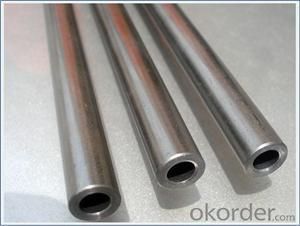
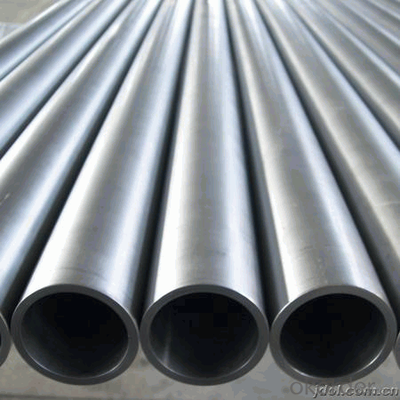
- Q: How are steel pipes used in the infrastructure development?
- Steel pipes are widely used in infrastructure development for various purposes such as water supply, sewage systems, gas pipelines, and transportation of oil and natural gas. They provide a durable and efficient solution for the construction of underground and aboveground infrastructure, ensuring the safe and reliable transportation of fluids and gases. Steel pipes are also used in the construction of bridges, buildings, and other structural components, as they offer strength, versatility, and resilience to withstand harsh environmental conditions.
- Q: How are steel pipes used in the manufacturing of HVAC systems?
- Steel pipes are commonly used in the manufacturing of HVAC systems for various purposes. They are primarily used for transporting fluids such as water, refrigerants, and gases throughout the system. Steel pipes provide durability and strength, ensuring the safe and efficient transfer of these substances. Additionally, steel pipes are often used for structural support, acting as a framework for the HVAC system. Overall, steel pipes play a crucial role in the manufacturing of HVAC systems by facilitating fluid transportation and providing structural stability.
- Q: What are the specific differences between flexible pipes and rigid pipes?
- Watch from outside:The rigid waterproof sleeve is made up of steel bushing and wing ring, and the structure is simple;The flexible waterproof sleeve mainly consists of flange sleeve, sealing ring, flange, pressure plate, wing ring, bolt and nut. The structure is complicated.
- Q: Are steel pipes resistant to corrosion?
- Yes, steel pipes are generally resistant to corrosion due to their composition, which includes a protective layer of zinc or other anti-corrosion coatings. However, factors such as exposure to harsh environments or chemicals can affect the level of corrosion resistance.
- Q: What are the different types of steel pipe coatings for marine applications?
- There are several types of steel pipe coatings commonly used for marine applications, including epoxy coatings, polyurethane coatings, zinc coatings, and fusion-bonded epoxy coatings. Each coating offers different benefits such as corrosion resistance, abrasion resistance, and protection against marine organisms. The choice of coating depends on factors such as the specific marine environment, the level of corrosion protection required, and the budget.
- Q: How are steel pipes used in the mining and mineral processing industry?
- Steel pipes are commonly used in the mining and mineral processing industry for various purposes such as transporting liquids, gases, and slurries, as well as providing structural support for mining infrastructure. These pipes are highly durable and resistant to corrosion, making them suitable for harsh and demanding environments. They are used for tasks such as transporting water for mining operations, carrying tailings and waste materials, and conveying mining chemicals. Additionally, steel pipes are utilized in the construction of mine shafts, tunnels, and processing plants, providing a strong and reliable framework for mining operations.
- Q: What is the maximum bending radius for steel pipes?
- The maximum bending radius for steel pipes typically depends on the specific grade and diameter of the pipe, but generally, it ranges from three to five times the pipe's outer diameter.
- Q: What is the difference between steel pipe and copper pipe?
- The main difference between steel pipe and copper pipe lies in their material composition. Steel pipe is made of steel, while copper pipe is made of copper. Steel pipe is stronger and more durable, making it suitable for high-pressure and heavy-duty applications. On the other hand, copper pipe is more malleable and corrosion-resistant, making it ideal for plumbing and water supply systems. Additionally, copper pipe is more expensive than steel pipe but offers better heat conductivity, making it suitable for heating and cooling applications.
- Q: What is the difference between steel pipes and copper pipes?
- The main difference between steel pipes and copper pipes lies in their material composition. Steel pipes are made of iron and carbon, while copper pipes are composed of copper metal. Additionally, steel pipes are generally more durable and can withstand higher pressure and temperature levels, making them suitable for industrial applications. On the other hand, copper pipes are more malleable and easily bent, making them ideal for residential plumbing systems. Moreover, copper pipes have better corrosion resistance compared to steel pipes, which may require coatings or treatments to prevent rusting.
- Q: What are the specifications for steel pipes used in high-pressure applications?
- The specifications for steel pipes used in high-pressure applications typically include factors such as material composition, wall thickness, diameter, and pressure rating. These pipes are often made from strong and durable steel alloys, such as carbon steel or stainless steel, to ensure their ability to withstand high pressures. The wall thickness and diameter of the pipe are carefully selected to handle the specific pressure requirements of the application. Additionally, the pipes may need to meet certain industry standards, such as ASTM or ASME codes, to ensure their quality and performance in high-pressure environments.
Send your message to us
Stainless Steel Welded Pipes 202 grade for decoration
- Loading Port:
- Qingdao
- Payment Terms:
- TT or LC
- Min Order Qty:
- 10 m.t.
- Supply Capability:
- 2000 m.t./month
OKorder Service Pledge
OKorder Financial Service
Similar products
Hot products
Hot Searches
Related keywords
